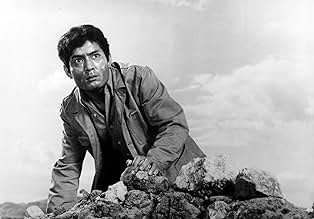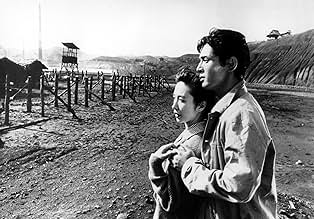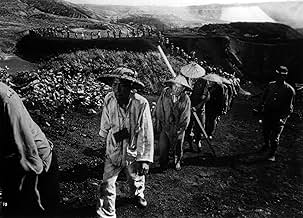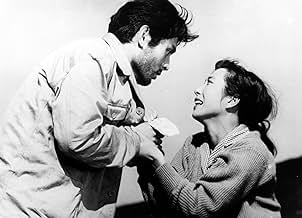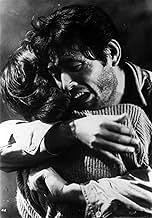La Condition de l'homme 1 - Il n'y a pas de plus grand amour
Titre original : Ningen no jôken
NOTE IMDb
8,5/10
10 k
MA NOTE
Ajouter une intrigue dans votre langueA Japanese pacifist, unable to face the dire consequences of conscientious objection, is transformed by his attempts to compromise with the demands of war-time Japan.A Japanese pacifist, unable to face the dire consequences of conscientious objection, is transformed by his attempts to compromise with the demands of war-time Japan.A Japanese pacifist, unable to face the dire consequences of conscientious objection, is transformed by his attempts to compromise with the demands of war-time Japan.
- Réalisation
- Scénario
- Casting principal
- Récompenses
- 5 victoires et 1 nomination au total
Kôji Nanbara
- Kô
- (as Shinji Nanbara)
Avis à la une
Kobayashi's "The Human Condition" is one of a handful of great anti-war movies. While Japanese film has confronted its own crimes of war more than other cinema, I am only familiar with one other Japanese movie which deals directly with the war & the plight of conscientious objectors: Kurosawa's "No Regrets for Our Youth". Many films deal with the futility of war: "Seven Samurai" & "Yojimbo" come immediately to mind. But "Human Condition" takes on the enormity of war, & the means by which everyone becomes complicit in its total corruption. The hero, though a Conscientious Objector, becomes a colonial occupier, an exploiter of slave labor, an employer of a madam who runs a camp of women & girls impressed into prostitution, & generally runs the gamut of crimes against humanity while trying to maintain his virtue & love's beauty.
Parts II & III also explore the brutality of the army toward its own soldiers, & the complete desecration of the ideals of the Russian Revolution & the cruelty of ordinary Chinese villagers.
"The Human Condition" should be ranked with "Grand Illusion", though what could be as lyrical as the Renoir film? If only this were require viewing in all military academies. If only it were required viewing for all lawmakers & the executive. Is that asking too much?
Parts II & III also explore the brutality of the army toward its own soldiers, & the complete desecration of the ideals of the Russian Revolution & the cruelty of ordinary Chinese villagers.
"The Human Condition" should be ranked with "Grand Illusion", though what could be as lyrical as the Renoir film? If only this were require viewing in all military academies. If only it were required viewing for all lawmakers & the executive. Is that asking too much?
This is the first of three very long movies that are based on Jumpei Gomikawa's six-volume series. It is set during WWII and is about a Japanese man named Kaji. Kaji is a very liberal man for the times--something that COULD be very dangerous in the militaristic Japanese society. When he's called up to fight in the war, he's torn. He's basically a pacifist at heart and cannot see himself killing another. Luckily for him, his boss gives him a choice--report for military duty or go off to Japanese occupied territory to be the production head for a forced labor camp. Not surprisingly, he goes to work at the camp--and takes his new wife with him.
When he sees the camp, Kaji is angered--the soldiers brutalize the workers and have absolutely no regard for them. The camp is also rife with corruption. He insists that the beatings MUST stop and he is opposed by the staff--but he's not willing to budge and he has the authority to make it stick. Fortunately, when the workers are better few and treated well, production increases dramatically. However, when there are prison escapes, the hardliners press for a return to brutality. After all, they feel, these aren't exactly humans--just Chinese and Korean conscripts and, worse, Japanese political prisoners. What is Kaji to do? As the film progresses, to save himself he may need to forget about his high ideals. But, can he live with himself? And what about his marriage? Because of the job, he's withdrawn and miserable--and a lousy husband. I'd say more, but this would ruin the film.
Overall, an excellent film that is worth seeing. I am excited to see what happens in the second film, as at the end of the first there is a BIG twist and Kaji's world has been turned upside down in the process. My only question is could this film STILL be a bit sanitized? From what I've read about these camps, they were MUCH more brutal than even the film portrayed.
When he sees the camp, Kaji is angered--the soldiers brutalize the workers and have absolutely no regard for them. The camp is also rife with corruption. He insists that the beatings MUST stop and he is opposed by the staff--but he's not willing to budge and he has the authority to make it stick. Fortunately, when the workers are better few and treated well, production increases dramatically. However, when there are prison escapes, the hardliners press for a return to brutality. After all, they feel, these aren't exactly humans--just Chinese and Korean conscripts and, worse, Japanese political prisoners. What is Kaji to do? As the film progresses, to save himself he may need to forget about his high ideals. But, can he live with himself? And what about his marriage? Because of the job, he's withdrawn and miserable--and a lousy husband. I'd say more, but this would ruin the film.
Overall, an excellent film that is worth seeing. I am excited to see what happens in the second film, as at the end of the first there is a BIG twist and Kaji's world has been turned upside down in the process. My only question is could this film STILL be a bit sanitized? From what I've read about these camps, they were MUCH more brutal than even the film portrayed.
10crubpni
Hello, my name's Jacob. I'm a 21 year old guy, from Israel, forced to join the army at the age of 18 as nearly all people of my country have to, forced to waste 3 years of my life doing things I'd never want to do if only I was allowed to choose. I'm not a great movie buff. I'm a simple person, and I'd rather play a video game to kill time, but I do like action and war films which is how I got to see "The human condition" on some list here on IMDb. Sounded interesting, and so I decided to watch the 3 films. So this is a review about all 3...
The films accurately demonstrates, maybe to the extreme, what it is to be a peace-loving, good human being, in a place where fascism and cruelty reigns supreme. Some people may say that Kaji's character is too unbelievable. Too saint-like, to the point where it becomes frustrating. I say it's not true- It's a movie, not real life. Kaji's behaviour might not be realistic, he faces humanity's worst traits with his own altruist ideals of pacifism and equality, as if he's some sort of WW2 superhero. Saying one cannot identify with him is wrong, however, in my humble opinion, because even if maybe you wouldn't act the way he did when put in the same situations, you can appreciate the way he handled himself, you can admire him and aspire to be like him. He isn't a saint though, he makes mistakes, born out of the cruelty and misery that surrounds him, betraying at times the "code" that he is supposed to protect and follow, but even then, you know that ultimately deep down he's the same person, no matter how things go.
Seeing many many irrational things in my military service, I can relate to Kaji in many ways. Seeing people who dedicate their lives to controlling others for the sake of getting promoted, to get appreciated by their superiors who actually appreciate them about as little as they appreciate their own soldiers. People who care for their own interests far more than they care for the interests of those they are in charge of, crushing their wants and needs and deeming them unimportant in the blink of an eye, while their own interests take much higher priority... People who enforce and follow strict rules that are unbending and unreasonable, with such a passion, that it makes you think any reasonable man would dismiss those people as insane, yet still, those are the people who are in charge, because they are the ones who stay in the army and dedicate their lives to it and to it's incredible stupidity, while the real reasonable people go on to dedicate their lives to do something that might actually be beneficial to humanity. This has now officially become somewhat of a rant of how terrible military life and discipline is, maybe more so than it is a review of this series of movies. But why I am saying all of this? because these observations of mine- they are accurately depicted in this movie. If only these real life people that I know were just trying to be a bit better, a bit more human, more like Kaji, maybe my impression of what the army is like wouldn't have been so gloomy as they are now. Kaji, in the films, tries-everywhere he goes-to set things right for those around him, he goes through so many terrible things, scenes that are so... Vile, and so distorted from what you think of human nature as it is in our usually comfortable modern life, and with sheer willpower, he triumphs, even if his triumph is just in him, staying alive while everything else is gone. But ultimately, does it do him any good? If he were to die in the first movie, would that have been better? saved him the suffering of everything he went through later? Well, that is for you to decide. What these films have taught me, is that no matter how it ends, it is important for a person to do what he sees as the right thing to do, and to never lose sight of what the right thing to do is... I'd define a good movie as one that makes you think at the end. It doesn't have to be a cool plot twist at the end that makes you think, it just has to be a movie complex enough but also engaging enough to make you think at the end, because you didn't have time to figure out everything you wanted while you were watching it. At the end of the third movie however, I didn't have to think of anything. I had already absorbed everything. All I wanted was to sleep, and just couldn't. My mind was empty, and I could feel only one thing- awe. And that is why I rate "The human condition" 10/10.
I'm terribly sorry if what you just read sounded like a bunch of drivel. Maybe this review is not for you, and maybe the movie is not for you. But regardless, I thank you for reading it to the very end. Have a nice day.
The films accurately demonstrates, maybe to the extreme, what it is to be a peace-loving, good human being, in a place where fascism and cruelty reigns supreme. Some people may say that Kaji's character is too unbelievable. Too saint-like, to the point where it becomes frustrating. I say it's not true- It's a movie, not real life. Kaji's behaviour might not be realistic, he faces humanity's worst traits with his own altruist ideals of pacifism and equality, as if he's some sort of WW2 superhero. Saying one cannot identify with him is wrong, however, in my humble opinion, because even if maybe you wouldn't act the way he did when put in the same situations, you can appreciate the way he handled himself, you can admire him and aspire to be like him. He isn't a saint though, he makes mistakes, born out of the cruelty and misery that surrounds him, betraying at times the "code" that he is supposed to protect and follow, but even then, you know that ultimately deep down he's the same person, no matter how things go.
Seeing many many irrational things in my military service, I can relate to Kaji in many ways. Seeing people who dedicate their lives to controlling others for the sake of getting promoted, to get appreciated by their superiors who actually appreciate them about as little as they appreciate their own soldiers. People who care for their own interests far more than they care for the interests of those they are in charge of, crushing their wants and needs and deeming them unimportant in the blink of an eye, while their own interests take much higher priority... People who enforce and follow strict rules that are unbending and unreasonable, with such a passion, that it makes you think any reasonable man would dismiss those people as insane, yet still, those are the people who are in charge, because they are the ones who stay in the army and dedicate their lives to it and to it's incredible stupidity, while the real reasonable people go on to dedicate their lives to do something that might actually be beneficial to humanity. This has now officially become somewhat of a rant of how terrible military life and discipline is, maybe more so than it is a review of this series of movies. But why I am saying all of this? because these observations of mine- they are accurately depicted in this movie. If only these real life people that I know were just trying to be a bit better, a bit more human, more like Kaji, maybe my impression of what the army is like wouldn't have been so gloomy as they are now. Kaji, in the films, tries-everywhere he goes-to set things right for those around him, he goes through so many terrible things, scenes that are so... Vile, and so distorted from what you think of human nature as it is in our usually comfortable modern life, and with sheer willpower, he triumphs, even if his triumph is just in him, staying alive while everything else is gone. But ultimately, does it do him any good? If he were to die in the first movie, would that have been better? saved him the suffering of everything he went through later? Well, that is for you to decide. What these films have taught me, is that no matter how it ends, it is important for a person to do what he sees as the right thing to do, and to never lose sight of what the right thing to do is... I'd define a good movie as one that makes you think at the end. It doesn't have to be a cool plot twist at the end that makes you think, it just has to be a movie complex enough but also engaging enough to make you think at the end, because you didn't have time to figure out everything you wanted while you were watching it. At the end of the third movie however, I didn't have to think of anything. I had already absorbed everything. All I wanted was to sleep, and just couldn't. My mind was empty, and I could feel only one thing- awe. And that is why I rate "The human condition" 10/10.
I'm terribly sorry if what you just read sounded like a bunch of drivel. Maybe this review is not for you, and maybe the movie is not for you. But regardless, I thank you for reading it to the very end. Have a nice day.
This is an excellent film about one man attempting to change the system. Kaji brings his youthful enthusiasm, idealism, and humanism against a cruel, unjust machine. The acting, direction, and cinematography are all world class. This is a gripping film which will leave you yearning for part two. This is just the start of a stunning epic.
An interesting film that portrays the struggles of an idealistic young Japanese man who is challenged to employ his idealism in the service of the Japanese war effort in WW II. A key aspect of this struggle is the protagonist's struggle within himself. Kaji, the young man, seeks to humanize the brutal conditions at a mining operation in Manchuria. Further complicating matters is the profound sense of national prejudice that shapes the relationships between the various characters. To the workers & Chinese prisoners, regardless of his professed ideals, Kaji is Japanese and therefore an oppressor. Although Kaji tries to win their trust, his own frustration enables him to strike a young Chinese helper, reinforcing the image of the brutal Japanese. This weakness is a key underlying theme. Even late in the film, when he takes a very brave stand against some executions, his effort is a bit late and his stand is successful only when the Chinese prisoners take up the protest. He struggles because her fears he cannot live up to the ideals he expresses.
Kaji is also confronted with the another irony. Although he opposes the war, he has chosen a route of avoidance rather than resistance. This is emphasized early in the film during an evening with a friend who is about to be inducted. His friend comments that, although they opposed the war, neither of them was brave enough to face the penalty for resistance of life imprisonment. Shortly thereafter, he takes the mine job to get a military exemption. Yet, if he is successful, the production improvements in the mine only fuel the Japanese war machine.
A valuable film because it explores areas of the pacific war that are not well know in the west. Also an interesting observation in the danger of half-measures when taking a moral stance. Kaji is ultimately confronted with the fact that you cannot avoid the war, only oppose it or aid it. I look forward to viewing the next film.
Kaji is also confronted with the another irony. Although he opposes the war, he has chosen a route of avoidance rather than resistance. This is emphasized early in the film during an evening with a friend who is about to be inducted. His friend comments that, although they opposed the war, neither of them was brave enough to face the penalty for resistance of life imprisonment. Shortly thereafter, he takes the mine job to get a military exemption. Yet, if he is successful, the production improvements in the mine only fuel the Japanese war machine.
A valuable film because it explores areas of the pacific war that are not well know in the west. Also an interesting observation in the danger of half-measures when taking a moral stance. Kaji is ultimately confronted with the fact that you cannot avoid the war, only oppose it or aid it. I look forward to viewing the next film.
Le saviez-vous
- AnecdotesAccording to Tatsuya Nakadai, a marathon screening of the entire nine-and-a-half-hour "Human Condition" trilogy is held once a year in Japan, and he has once or twice attended these screenings, which are always sold out.
- GaffesAt one point a Japanese guard begins to whip Kao, yet the motions he makes are just a flailing of his arms, visibly missing the actor. Kao retaliates by throwing a rock at the guard, but the rock never strikes the guard. However, the actor playing the guard overreacts as if he has been struck.
- Citations
Kuroki Shochô: You know, Kaji, theory may be correct and yet not always apply to reality.
Kaji: Then either the theory is wrong or it was incorrectly applied.
- ConnexionsFollowed by La Condition de l'homme 2 - Le Chemin de l'éternité (1959)
Meilleurs choix
Connectez-vous pour évaluer et suivre la liste de favoris afin de recevoir des recommandations personnalisées
- How long is The Human Condition I: No Greater Love?Alimenté par Alexa
Détails
- Date de sortie
- Pays d’origine
- Langues
- Aussi connu sous le nom de
- The Human Condition I: No Greater Love
- Lieux de tournage
- Hokkaido, Japon(Exterior scenes of the Manchurian mine)
- Sociétés de production
- Voir plus de crédits d'entreprise sur IMDbPro
- Durée
- 3h 28min(208 min)
- Couleur
- Mixage
- Rapport de forme
- 2.35 : 1
Contribuer à cette page
Suggérer une modification ou ajouter du contenu manquant


